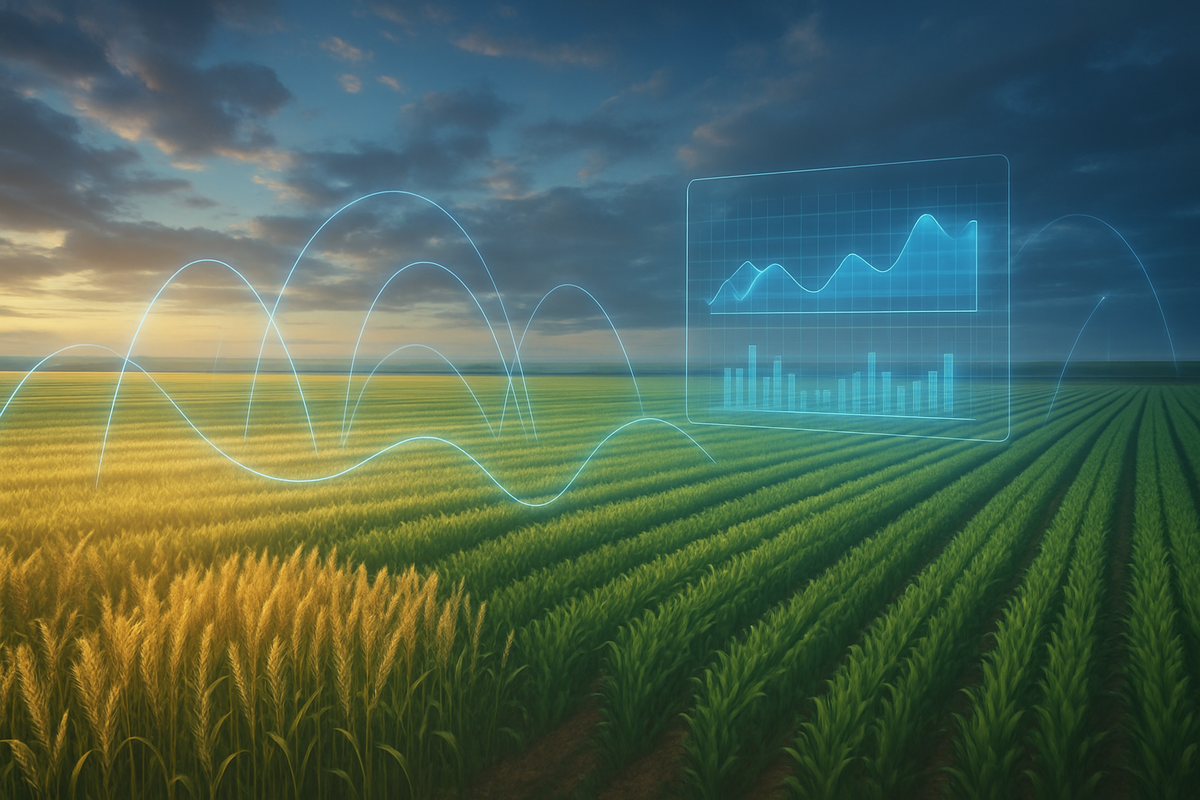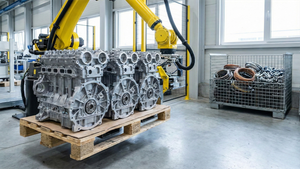
Helios AI, an emerging leader in AgTech, has announced a significant milestone, securing $4.7 million in seed funding to launch its groundbreaking AI Copilot, Helios Horizon. This strategic investment, spearheaded by Collide Capital and supported by a consortium of notable investors including S&P Global Ventures (NYSE: SPGI), aims to fundamentally transform how agricultural commodity prices are predicted and managed across the global food supply chain. The move positions Helios AI at the forefront of leveraging artificial intelligence to bring unprecedented accuracy and accessibility to a sector grappling with increasing volatility.
The timing of this announcement, occurring in late September 2025, places Helios AI's innovation directly into the current financial landscape, poised to make an immediate impact. Helios Horizon, touted as the first-ever AI co-pilot for agri-food supply chains, promises to deliver "Bloomberg-level intelligence" by integrating real-time climate predictions with comprehensive agri-food price forecasting. This development signals a major leap forward for food businesses seeking to optimize margins, manage risk, and make proactive decisions in an era defined by climate change and economic uncertainty.
Helios Horizon: A New Dawn for Agri-Food Intelligence
The $4.7 million seed funding round for Helios AI was successfully led by Collide Capital, with substantial contributions from a diverse group of investors including S&P Global Ventures (NYSE: SPGI), Stray Dog Capital, Angeles VC, Equity Alliance, and Supply Change Capital. This capital infusion is earmarked for scaling Helios AI's proprietary technology, expanding its global coverage, and recruiting top-tier talent, all crucial steps in solidifying its market position. The official launch of Helios Horizon and the completion of this funding round occurred in the final days of September 2025, making this a highly current and impactful development in the AgTech space.
Helios Horizon is engineered to be the first-ever AI co-pilot tailored specifically for food and agriculture supply chains. Its core function is to merge agri-food price forecasting with critical climate predictions, offering a dynamic and holistic view of market forces. The platform operates on a sophisticated multi-agent AI system that meticulously aggregates and analyzes billions of diverse data points. These include historical yields, evolving weather patterns, global news reports, intricate trade flows, and futures market data, all processed to provide real-time insights.
This innovative approach allows Helios Horizon to deliver "Bloomberg-level intelligence" directly to food businesses, empowering them to optimize margins in an increasingly unpredictable environment. A key differentiator is its user-friendly interface, enabling users to pose natural-language questions and receive instant, business-specific, and analyst-grade reports, thereby streamlining complex data analysis into actionable insights. This capability is particularly vital as climate change and macroeconomic shifts continue to drive unprecedented volatility in agricultural supply chains.
The immediate implications of Helios Horizon are profound. Helios AI asserts that its forecasting capabilities are up to five times more accurate than conventional industry models, which often rely on basic seasonality and rudimentary supply-demand metrics. This enhanced accuracy stems from its continuous ingestion and refreshment of billions of real-time signals, allowing it to account for current volatility drivers more effectively. Furthermore, the AI Copilot boasts comprehensive coverage across more than 75 agricultural commodities and over 2,500 price series, spanning everything from staple crops like coffee and soybeans to specialized goods such as cocoa, fruits, and vegetables, providing an expansive view of the global food ecosystem.
Market Movers: Who Wins and Who Loses?
The emergence of Helios AI's (OTCQB: HLSAI) Helios Horizon is set to create distinct winners and losers within the agricultural and food sectors. The most immediate beneficiaries will be the food businesses and procurement leaders who adopt this AI Copilot. By gaining access to highly accurate, real-time predictions on supply availability and price fluctuations, these entities can proactively manage risks, secure supply ahead of competitors, and negotiate more favorable contracts. This could lead to significant improvements in operational efficiency and profit margins for companies ranging from large food processors and distributors to restaurant chains and retailers.
Companies that embrace this technology early are likely to gain a substantial competitive edge. For instance, major food manufacturers like Nestlé (SWX: NESN) or General Mills (NYSE: GIS), which rely heavily on stable commodity prices, could leverage Helios Horizon to optimize their purchasing strategies, reduce waste, and improve inventory management. Similarly, large agricultural trading houses such as Archer-Daniels-Midland (NYSE: ADM) or Bunge Global SA (NYSE: BG) might integrate such AI tools to refine their trading algorithms and risk assessment models, potentially enhancing their market positions and profitability.
Conversely, traditional market intelligence providers that offer less dynamic or less comprehensive forecasting solutions could face significant challenges. If Helios Horizon lives up to its promise of superior accuracy and accessibility, it could disrupt the established landscape of agricultural data and analytics. Companies heavily invested in older, less agile predictive models may see their market share erode as clients migrate to more advanced AI-driven platforms. Furthermore, businesses that are slow to adopt such innovative technologies risk being outmaneuvered by more technologically forward competitors, potentially leading to increased costs, missed opportunities, and reduced competitiveness in a rapidly evolving market.
The democratization of "Bloomberg-level intelligence" at an accessible price point, starting at $299 per month, also implies a shift. While large corporations have historically had the resources to access expensive, high-tier market data, Helios AI aims to extend this capability to a broader spectrum of users, including independent farmers, local restaurant owners, and regional distributors. This could empower smaller players to compete more effectively, potentially challenging the dominance of larger entities that have historically benefited from exclusive access to superior market insights.
Broader Industry Implications and Trends
Helios AI's (OTCQB: HLSAI) successful funding and the launch of Helios Horizon fit perfectly into several overarching industry trends, primarily the accelerating integration of artificial intelligence into agriculture, often termed AgTech. The agricultural sector, traditionally slower to adopt digital transformation, is now rapidly embracing AI, IoT, and big data to address critical challenges such as climate change, food security, and supply chain inefficiencies. Helios Horizon exemplifies this trend by directly tackling the volatility in commodity markets, a direct consequence of unpredictable weather patterns and global economic shifts.
The potential ripple effects on competitors and partners are significant. For other AgTech firms, Helios AI's success could spur increased investment and innovation in AI-driven predictive analytics. Competitors might be forced to enhance their own offerings, potentially leading to a wave of advanced solutions in the market. On the partnership front, Helios AI could become an attractive collaborator for agricultural input suppliers, logistics companies, and financial institutions looking to offer enhanced risk management tools to their clients. For instance, agricultural insurers might integrate Helios Horizon's data to refine their risk models and policy offerings.
Regulatory and policy implications are also worth considering. As AI plays a more central role in critical sectors like food supply, there will likely be increased scrutiny from regulatory bodies regarding data privacy, algorithmic transparency, and market fairness. Governments may look to establish new guidelines or standards for AI applications in agriculture to ensure equitable access to information and prevent market manipulation. The global nature of agricultural commodity markets also suggests potential international cooperation on data sharing and AI governance.
Historically, the agricultural sector has seen numerous attempts to improve forecasting, from traditional econometric models to satellite imagery analysis. However, the multi-agent AI approach of Helios Horizon, which synthesizes billions of diverse signals in real-time, represents a significant leap beyond these predecessors. It draws parallels to the financial sector's adoption of AI for high-frequency trading and risk management, suggesting that agricultural markets are now catching up in their use of sophisticated predictive technologies. The current event marks a potential inflection point, moving beyond incremental improvements to a genuinely transformative application of AI in agricultural commodity prediction.
What Comes Next for Agricultural Prediction
In the short term, the immediate focus for Helios AI (OTCQB: HLSAI) will undoubtedly be on the successful deployment and adoption of Helios Horizon. This includes onboarding initial clients, refining the AI Copilot based on user feedback, and demonstrating tangible results in terms of improved forecasting accuracy and operational efficiencies for its users. The company will likely concentrate on expanding its customer base across the diverse segments it targets, from individual farmers to large enterprises, leveraging its competitive pricing model. We can expect aggressive marketing and partnership initiatives to solidify its position in the burgeoning AgTech market.
Looking further ahead, the long-term possibilities for Helios Horizon are vast. The platform could evolve to offer even more granular insights, potentially incorporating hyper-local weather data, specific crop disease outbreak predictions, or even geopolitical analyses that impact trade flows. Strategic pivots might include expanding into adjacent markets, such as water resource management or sustainable farming practices, where predictive AI can also play a crucial role. Helios AI could also explore integration with other AgTech solutions, creating a more comprehensive ecosystem for agricultural management.
Market opportunities that may emerge include the potential for Helios AI to become a standard tool for agricultural risk management, similar to how Bloomberg Terminals (NYSE: BBE) are indispensable in finance. This could open doors for licensing its AI models to other data providers or even developing specialized versions of Helios Horizon for specific commodity groups or geographical regions. Challenges, however, will include maintaining its technological edge against new competitors, managing the complexity of integrating diverse data sources, and ensuring the continued trust and accuracy of its predictions in an ever-changing climate and economic landscape.
Potential scenarios and outcomes range from Helios AI becoming a dominant force in agricultural commodity prediction, leading to a more efficient and resilient global food supply chain, to facing stiff competition from established players or new entrants. A successful outcome could see significant reductions in food waste, more stable commodity prices, and increased profitability for agricultural stakeholders. Conversely, if the technology fails to consistently deliver on its promises or if regulatory hurdles become too complex, its impact might be more limited. The coming months will be crucial in determining its trajectory and the broader implications for the agricultural sector.
A New Era of Informed Agricultural Decisions
Helios AI's (OTCQB: HLSAI) securing of $4.7 million in seed funding and the launch of its AI Copilot, Helios Horizon, marks a pivotal moment for the agricultural sector. The key takeaway is the immediate and significant leap in the accuracy and accessibility of agricultural commodity prediction. By leveraging a multi-agent AI system that processes billions of real-time signals, Helios AI promises to equip food businesses, from independent farmers to multinational corporations, with unprecedented intelligence to navigate the volatile landscape of global food supply chains. This event underscores a broader trend of advanced AI applications transforming traditional industries.
Moving forward, the market will undoubtedly watch closely to see how quickly Helios Horizon gains traction and delivers on its ambitious claims of superior forecasting accuracy and operational efficiency. The democratization of "Bloomberg-level intelligence" at an affordable price point is a game-changer, potentially leveling the playing field for smaller players while empowering larger entities with more refined tools. This could lead to a more resilient and responsive agricultural ecosystem, better equipped to handle the challenges posed by climate change, geopolitical instability, and fluctuating demand.
The lasting impact of Helios AI's innovation could be a fundamental shift in how decisions are made across the entire agri-food value chain, moving from reactive responses to proactive strategies. This could translate into reduced food waste, more stable prices for consumers, and improved profitability for producers and distributors. It also highlights the growing importance of AgTech as an investment area, attracting capital to solutions that address global challenges.
Investors should watch for several key indicators in the coming months. These include the rate of customer acquisition for Helios Horizon, anecdotal evidence and case studies demonstrating its effectiveness, and any strategic partnerships Helios AI might form with major players in the agricultural or technology sectors. The company's ability to scale its technology, expand its data coverage, and maintain its predictive accuracy will be crucial determinants of its long-term success and its lasting impact on the future of food.
This content is intended for informational purposes only and is not financial advice





